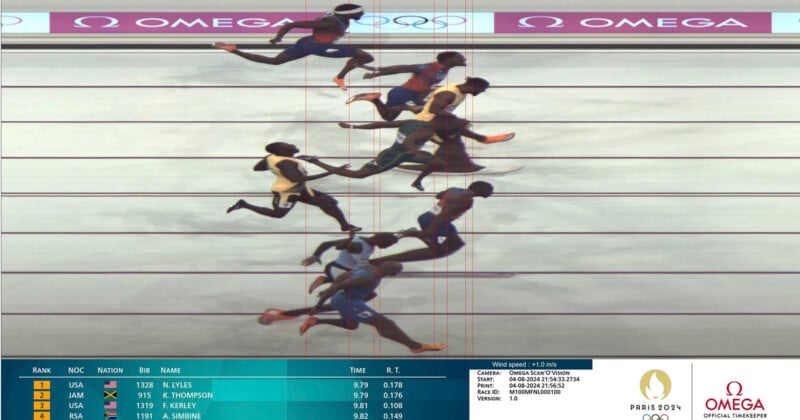A Camera That Shoots 40,000 FPS Decided the 100-Meter Sprint Final

The men’s 100-meter final on Sunday night was historically close with American Noah Lyles edging out Jamaica’s Kishane Thompson by five-thousandths of a second after a photo finish review.
Upon finishing the race, it took 30 seconds for the organizers to determine who had won with the judges turning to an image taken by an Omega camera that shoots 40,000 frames per second.
Noah Lyles wins arguably the greatest 100 meter final of all-time and wins the gold in a photo finish! #Paris2024
(🎥: @NBCOlympics) pic.twitter.com/CLFw1dlqrq
— Kevin Gray Jr. (@KevinGraySports) August 4, 2024
Omega has been the Olympics’ official timekeeper for decades and the instrument is a new piece of technology that better measures athletes’ performance and in this case figure out who just won.
According to Axios, the new camera by Omega takes four times as many pictures per second as the previous system. It is also a higher resolution.
Both Lyles and Thompson ran a time of 9.78 seconds but the runner who gets their torso across the line first is the winner. The red lines represent the position used by the officials to judge whose body reached the line first.
The camera is called the Omega Scan ‘O’ Vision Ultimate which is an upgrade on its 10,000 frames per second camera the Scan ‘O’ Vision Myria. Because it can take so many pictures, the system can recreate a full picture of who exactly crossed the line first. It focuses on the finish line.
This technology is part of Omega’s broader innovations for the Paris 2024 Olympics, which also include advanced Computer Vision systems. These systems employ high-definition cameras and AI models to track athletes and equipment in real-time, providing detailed performance metrics across various sports
This edit of the Men's 100 meter final in progress
Absolutely incredible, the gap from Lyles (1st) to Seville (8th) was just 0.12 seconds
📹 Hector Vivas via Getty Images pic.twitter.com/IcaThSDj74
— Spellbinding Odyssey (@SpellOdyssey) August 5, 2024
Omega has brought 350 tons of gear to the Olympics including 124 miles (200 kilometers) of cable and 550 timekeepers. Axios notes that 55 of those are devoted just to the athletics, the most for any event.